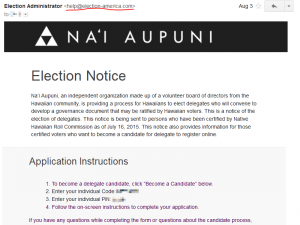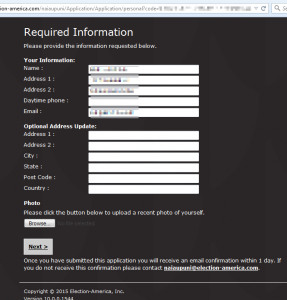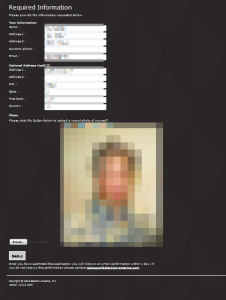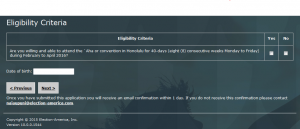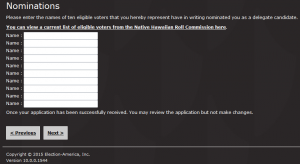Today, December 15 2015, Na’i Aupuni announced that the delegate candidate election has been canceled, due to the legal obstacles it faces in the upcoming weeks, months, and years.
However, they will go forward with the ‘aha with all 200 candidates who want to participate, instead of the 40 with the most votes per district. This allows for the sidestepping the Akina v. Hawaii lawsuit brought by the Grassroot Institute. It is currently before the 9th circuit appeals court and a stay order on counting the votes by the U.S. Supreme Court. There is no more election, so the case is moot.
The audacity is stunning. It took me a while today to process the implications. I already had a splitting headache today, and the news didn’t help. I think I have a handle on it now, so I will make some points which have become clear to me:
- There will be no elected delegates representing their (participating) constituents; only attendees representing themselves.
- If somehow the ‘aha participants recommend a “governing document” of some kind, and if the same Kana’iolowalu voter list is used in an election to ratify it, the same legal jeopardy will apply as in the Akina v. Hawaii lawsuit.
This will be a debating society, but possibly with the funds available to run a ratification election. The “delegates” will possess zero authority to form a government (unless some find a way to show they are representing more than themselves). It will be no different than any arbitrary group of Kanaka getting together. Of course, they meant to do it via an election, but just throw it out the window, no need. Without the consent of the people there is no government.
Na’i Aupuni’s legal funding agreement with OHA and Akamai Foundation limits the scope of time to 15 months from Apr 2015– which is July 2016. They have a contractual obligation to wrap up by then. I’m sure this has figured heavily in their announcement today.
Clearly, nation-building or government-building cannot be done on such a tight schedule, and only serves those wanting to short-circuit political discussions and rush for Federal Recognition within the Obama presidency.
At this point, I have not decided whether to participate in this further diluted Na’i Aupuni educational and debating ‘aha. At some point, you need to decide if the sacrifice is worthwhile. Instead of engaging in the political arena with 39 other delegates with the authority vested by thousands of voters each, you would be engaging with 194 other self-appointed Hawaiians, representing no one but themselves and their own mana’o. We would be better off starting a new process including the whole lahui. No matter what happens to Na’i Aupuni, my kuleana is to assist the rebuilding of our nation. This will go on.
I understand that the building of any new government has many twists, turns, and stones in the path. I do not fault those making efforts in good faith – I applaud them. However, when meeting roadblocks, do not abandon principles or your faith.
For Na’i Aupuni ‘aha attendees, I propose the following guidelines:
- Affirm the recognition that delegates have no authority to draft a constitution for ratification; any document shall be advisory only.
- Use the opportunity to make face-to-face discussions with other participants. There are some who have been and will continue to be involved with Native Hawaiian governance in the years ahead. Even with differences, working towards cohesiveness is a worthwhile goal. So many forces has worked to divide lahui, we need to take control ourselves.
- Seriously assess the need to correct the Kana’iolowalu roll problems. Problems of exclusion, non-participation, and legal challenges have all been effects. Consider the advantages of voter list including Hawaiian National descendants– they are the “wronged parties” of the overthrow, could sue for restitution based on probate law, and could withstand a Rice v. Cayetano-type challenge.
- Reach out for independent electoral assistance from neutral 3rd parties, such as the Carter Center or International IDEA. Many peoples and nations around the world have moved forward from conflict to representative governments, and Hawaiians could benefit from lessons-learned and their guidelines.
- Always work for any way for Hawaiians to be counted
Since the delegate election has officially ended (terminated), let me take this opportunity to thank all my supporters: those who nominated me to be a candidate in writing, and those who cast votes in the delegate election. Mahalo nui to Brandon Makaawaawa and Bumpy Kanahele, who invited me to meet and discuss the values, principles, and practices of practical governance, and National Sovereignty at Pu’uhonua o Waimanalo. Mahalo nui to the organizers of the Halawai Aloha Aina, who put out the kahea to lahui to bring to light ‘a’ole pono processes. Mahalo nui to kanaka moderating the Facebook groups creating spaces for us to inform each other and grow together: Protest Na’i Aupuni, Hawai’i’imiloa, KAI’ULA, and Destination Restoration.
According to Na’i Aupuni, the votes will never be counted. Hawaiians are invisible again, but never again to each other.
Aloha and Maka’ala,
-Raul Nohea Goodness
p.s. – The deadline to submit your comments to opposed the Dept. of Interior’s rules on Federal Recognition is December 30! Go to ainalahui.com to submit your comments today! Only takes a few minutes.
